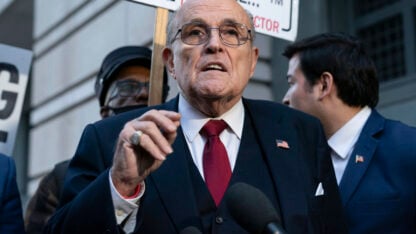Sen. Raphael Warnock, whose election as Georgia’s first Black senator helped hand control of the chamber to Democrats, used his first floor speech on Capitol Hill to blast a wave of Republican-backed measures that would make it harder to cast ballots in states around the country.
Warnock noted Georgia’s and the country’s history of allowing voter suppression against minorities and the poor, and he warned that some Republican lawmakers are trying to reopen those chapters with “draconian” restrictions he cast as a reaction against Democratic victories like his.
“We are witnessing right now a massive and unabashed assault on voting rights and voter access unlike anything we have seen since the Jim Crow era,” Warnock said Wednesday. “One person, one vote is being threatened right now. Politicians in my home state and all across America, in their craven lust for power, have launched a full-fledged assault on voting rights” and on “democracy itself.”
The first-term senator’s speech followed Senate Democrats’ introduction of a sweeping election law overhaul, called the “For the People Act,” that could override many of the restrictive measures that state GOP lawmakers are considering at the state level. The House passed its version in the previous Congress and again last month on a 220-210 vote that fell along party lines.
State GOP leaders, whose efforts come after former President Donald Trump falsely asserted that the 2020 elections were “rigged,” say their efforts are needed to prevent voter fraud and reassure voters that U.S. elections are legitimate.
Warnock blasted that reasoning as part of a “big lie.”
State elections officials from both major parties, including Georgia’s Republican secretary of state, have vouched for the 2020 results.
The Senate bill, among other provisions, would make automatic voter registration the norm nationwide, effectively forbid racial and partisan gerrymandering of district lines, establish national baselines for absentee voting and expand public financing of elections.
Lawmakers in Georgia and other states are considering severely curtailing absentee voting; eliminating automatic voter registration, often tied to driver license applications; and cutting back on early voting opportunities, including Sunday “souls to the polls” voting days that are especially important to Black churches where parishioners lean overwhelmingly Democratic.
Separately, Democrats in Congress want to restore key sections of the Voting Rights Act that required certain states and local jurisdictions with a history of racial discrimination to receive federal approval for their local voting procedures. The Supreme Court gutted those provisions in 2013.
Warnock is the lead sponsor of the Senate’s overarching voting bill. The choice is both symbolic and practical because of Warnock’s historical significance as a Black senator from the Deep South and because of how much minority voters could be affected by various voting law changes.
“He knows what voter suppression is like in Georgia. He knows what they’re doing now,” said Senate Majority Leader Chuck Schumer, D-N.Y. “I think he’s going to be a very persuasive voice for Democrats and Republicans” on the issue.
It’s also a recognition from Schumer of how important Georgia is in the national balance of power, with Warnock and his fellow first-term Democratic senator Jon Ossoff winning Jan. 5 runoffs in the state to force a 50-50 Senate that allowed Vice President Kamala Harris to become the tiebreaking vote.
Warnock, who won a special election, must seek reelection for a full term in the 2022 midterms, testing whether Democrats have staying power in Georgia after decades of Republican dominance in federal elections.









